| Srl | Item |
| 1 |
ID:
138999
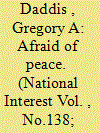

|
|
|
|
|
| Summary/Abstract |
EARLIER THIS year, West Point’s Defense and Strategic Studies Program invited me to participate in a panel discussion on the future of warfare. For historians, and particularly for Vietnam War students like me, such requests seem fraught with peril. Given the contentious debate that continues to surround America’s involvement in Vietnam, now fifty years after Lyndon Johnson’s fateful decision to send ground combat troops to Southeast Asia, commenting on the future of warfare obliges conjecture without much evidence. Yet for uniformed officers considering strategic issues and the use of military force, these questions surely are as sensible as they are unavoidable.
|
|
|
|
|
|
|
|
|
|
|
|
|
|
|
|
| 2 |
ID:
138994


|
|
|
|
|
| Summary/Abstract |
1968 IS BACK. A growing chorus of voices on the right is arguing that the riots in Baltimore and Ferguson are ushering in a new round of the culture wars. On the website Breitbart, for example, Robert W. Patterson, a former George W. Bush administration official, wrote, “The Grand Old Party must decide: Go libertarian, and sympathize with the protesters and rioters? Or does it want to be conservative, and side with the police, the rule of law, and the forces of order? The lessons of the 1960s suggest the latter is the path to victory.” William Kristol, editor of the neoconservative Weekly Standard, observed during the recent riots in Ferguson, “It does feel like a Nixon ’68 moment. Who will speak for the Silent Majority?
|
|
|
|
|
|
|
|
|
|
|
|
|
|
|
|
| 3 |
ID:
138997
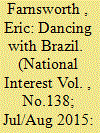

|
|
|
|
|
| Summary/Abstract |
BRAZIL IS on the move. Its economic strength over the past decade has provided the primary means for it to develop long-standing ambitions for a larger global-leadership stake—a path that U.S. policy makers have encouraged for many years, presuming that a stronger, democratic Brazil more actively engaged globally would be a natural ally for the United States. In so doing, however, it has pursued a foreign policy independent of Washington, leading at times to misunderstandings and dashed hopes. This was in evidence even before the revelations of National Security Agency contractor Edward Snowden in 2013 temporarily froze bilateral relations.
|
|
|
|
|
|
|
|
|
|
|
|
|
|
|
|
| 4 |
ID:
138995
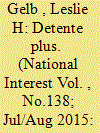

|
|
|
|
|
| Summary/Abstract |
With the Cold War’s demise, the menacing Russia that long loomed over Europe seemed to vanish. The Russia of 1992 was just a fragment of its historic self in military punch and economic weight. Not even Russia’s still-formidable nuclear arsenal deflected perceptions of decline. It was inevitable, then, that Western policy makers would feel that this shrunken Russia was more to be ignored than feared. They were wrong.
|
|
|
|
|
|
|
|
|
|
|
|
|
|
|
|
| 5 |
ID:
139001


|
|
|
|
|
| Summary/Abstract |
A VIRULENT new wave of anti-Semitism is generally believed to be sweeping across Europe. European societies have allegedly become poisonously inhospitable to a Jewish presence. Israel, itself a prime target of the new anti-Semitism, is preparing for large-scale immigration of Jews from the Continent. Europe’s old Adam is supposedly reasserting itself.
|
|
|
|
|
|
|
|
|
|
|
|
|
|
|
|
| 6 |
ID:
139000


|
|
|
|
|
| Summary/Abstract |
IS RETREAT from global hegemony in America’s national interest? No idea has percolated more widely over the past decade—and none is more bogus. The United States is not headed for the skids and there is no reason it should be. The truth is that America can and should seek to remain the world’s top dog.
|
|
|
|
|
|
|
|
|
|
|
|
|
|
|
|
| 7 |
ID:
138996
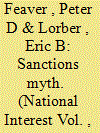

|
|
|
|
|
| Summary/Abstract |
SINCE 2005, American policy makers have increasingly turned to sophisticated types of economic sanctions as a foreign-policy tool of first resort. From the development of banking sanctions limiting Iran’s ability to secure financing from Western capital markets to new sanctions targeting Russia’s financial system and the development of its oil resources, U.S. policy makers are touting these innovative tools as extremely powerful while also being tailored and precise. The Obama administration’s 2015 National Security Strategy, for example, said that “targeted economic sanctions remain an effective tool for imposing costs on . . . irresponsible actors” and that “our sanctions will continue to be carefully designed and tailored to achieve clear aims while minimizing any unintended consequences for other economic actors, the global economy, and civilian populations.”
|
|
|
|
|
|
|
|
|
|
|
|
|
|
|
|
| 8 |
ID:
138998
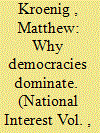

|
|
|
|
|
| Summary/Abstract |
CHINA’S ENORMOUS population and rapid rate of economic growth mean that Beijing could soon dislodge Washington from its standing as the most dominant power in Asia. The Economist, for example, predicts that China could overtake the United States as the world’s largest economy—an important measure of national power—in the year 2021. Moreover, we know that military might tends to follow economic heft. Beijing’s ongoing military buildup is already constraining America’s ability to project power in the Asia-Pacific region. If China follows Washington’s lead in investing in global power-projection capabilities, decades from now it could conceivably usurp global military supremacy from Washington.
|
|
|
|
|
|
|
|
|
|
|
|
|
|
|
|